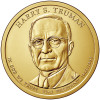
2015 $1.00 President Harry S. Truman D
# CNPRES33D - 2015 $1.00 President Harry S. Truman D
$6.50
Harry S. Truman (1884-1972)
33rd American President
Harry Truman was born in Lamar, Missouri. He began wearing eyeglasses when he was eight, and was cautioned not to break them. He later wrote, “I was afraid to join in the rough-and-tumble games of the backlot. My time was spent reading, and by the time I was 13 or 14 years old I had read all the books in the Independence Public Library and our old Bible three times through.” In 1905, he joined the Missouri National Guard. In 1918 he was sent to France, where he commanded an artillery battery as a captain. He later joined the Army reserves as a major and rose to the rank of colonel.
Truman was elected a county judge in Jackson County, Missouri, in 1922. In 1934 and 1940, he was elected a U.S. senator. As head of the Truman Committee, which analyzed defense spending, he saved the government about 25 billion dollars.
By 1944, President Franklin D. Roosevelt’s health was quite poor, and voters realized he might not live through his fourth term. Great importance was placed on the selection of his Vice President. Truman was selected as a compromise candidate, but he did not spend much time in this position. President Truman took office on April 12, 1945.
At that time, Allied armies were conquering Germany and preparing to invade Japan. On May 7, 1945, Germany surrendered. Truman proclaimed May 8 as V-E Day, or Victory in Europe Day. It was also his 61st birthday. Truman then ordered the atomic bomb to be used against Japan. Many historians consider this one of the most crucial decisions ever faced by an individual. By September 2, 1945, Japan had formally surrendered.
President Truman hoped to build on Roosevelt’s New Deal programs. His “Fair Deal” involved expanding Social Security, public housing and slum clearance, and a Fair Employment Practices Act. The Communist threat of the Soviet Union and the Cold War inspired the “Truman Doctrine,” which stated the U.S. would oppose Communist aggression, and promised aid to nations resisting Communist propaganda or sabotage.
Popularity polls placed President Truman as an underdog in the 1948 Presidential election. In fact, some newspapers even ran headlines saying his opponent, Thomas E. Dewey, had won. A victorious Truman delighted in these premature announcements.
On June 25, 1950, Communist North Korea attacked South Korea. President Truman reacted by sending military forces to aid South Korea. Truman later said he risked starting World War III – making this decision the toughest of his political career. By October 1950, most of Korea was under United Nations control, but then Communist troops from China entered the battle. Truman feared expanding the conflict and fought a limited war.
President Truman decided not to run for another term in 1952. He retired to Independence, Missouri, where he lived to be 88.
Harry S. Truman (1884-1972)
33rd American President
Harry Truman was born in Lamar, Missouri. He began wearing eyeglasses when he was eight, and was cautioned not to break them. He later wrote, “I was afraid to join in the rough-and-tumble games of the backlot. My time was spent reading, and by the time I was 13 or 14 years old I had read all the books in the Independence Public Library and our old Bible three times through.” In 1905, he joined the Missouri National Guard. In 1918 he was sent to France, where he commanded an artillery battery as a captain. He later joined the Army reserves as a major and rose to the rank of colonel.
Truman was elected a county judge in Jackson County, Missouri, in 1922. In 1934 and 1940, he was elected a U.S. senator. As head of the Truman Committee, which analyzed defense spending, he saved the government about 25 billion dollars.
By 1944, President Franklin D. Roosevelt’s health was quite poor, and voters realized he might not live through his fourth term. Great importance was placed on the selection of his Vice President. Truman was selected as a compromise candidate, but he did not spend much time in this position. President Truman took office on April 12, 1945.
At that time, Allied armies were conquering Germany and preparing to invade Japan. On May 7, 1945, Germany surrendered. Truman proclaimed May 8 as V-E Day, or Victory in Europe Day. It was also his 61st birthday. Truman then ordered the atomic bomb to be used against Japan. Many historians consider this one of the most crucial decisions ever faced by an individual. By September 2, 1945, Japan had formally surrendered.
President Truman hoped to build on Roosevelt’s New Deal programs. His “Fair Deal” involved expanding Social Security, public housing and slum clearance, and a Fair Employment Practices Act. The Communist threat of the Soviet Union and the Cold War inspired the “Truman Doctrine,” which stated the U.S. would oppose Communist aggression, and promised aid to nations resisting Communist propaganda or sabotage.
Popularity polls placed President Truman as an underdog in the 1948 Presidential election. In fact, some newspapers even ran headlines saying his opponent, Thomas E. Dewey, had won. A victorious Truman delighted in these premature announcements.
On June 25, 1950, Communist North Korea attacked South Korea. President Truman reacted by sending military forces to aid South Korea. Truman later said he risked starting World War III – making this decision the toughest of his political career. By October 1950, most of Korea was under United Nations control, but then Communist troops from China entered the battle. Truman feared expanding the conflict and fought a limited war.
President Truman decided not to run for another term in 1952. He retired to Independence, Missouri, where he lived to be 88.









